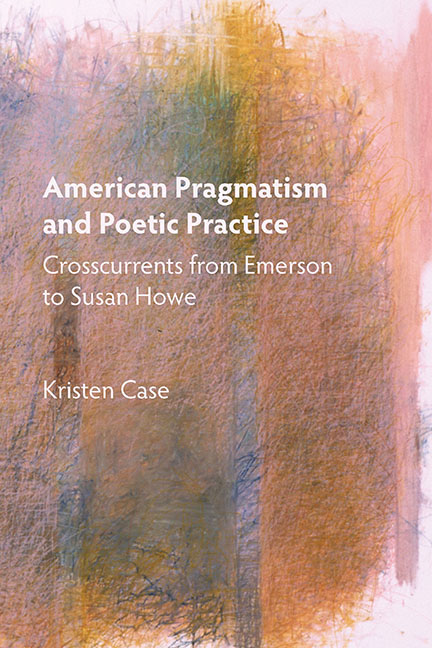Book contents
- Frontmatter
- Dedication
- Contents
- List of Illustrations
- Preface
- Acknowledgments
- 1 “By Their Fruits”: Words and Action in American Writing
- 2 Emerson, Moore, America
- 3 Robert Frost, Charles Sanders Peirce, and the Necessity of Form
- 4 “As Much a Part of Things as Trees and Stones”: John Dewey, William Carlos Williams, and the Difference in Not Knowing
- 5 Henry Thoreau, Charles Olson, and the Poetics of Place
- 6 Howe/James
- Works Cited
- Index
5 - Henry Thoreau, Charles Olson, and the Poetics of Place
Published online by Cambridge University Press: 08 April 2017
- Frontmatter
- Dedication
- Contents
- List of Illustrations
- Preface
- Acknowledgments
- 1 “By Their Fruits”: Words and Action in American Writing
- 2 Emerson, Moore, America
- 3 Robert Frost, Charles Sanders Peirce, and the Necessity of Form
- 4 “As Much a Part of Things as Trees and Stones”: John Dewey, William Carlos Williams, and the Difference in Not Knowing
- 5 Henry Thoreau, Charles Olson, and the Poetics of Place
- 6 Howe/James
- Works Cited
- Index
Summary
Shall I not have intelligence with the earth? Am I not partly leaves and vegetable mould myself?
— Thoreau, Walden, 432Much of the thinking about Thoreau and Charles Olson that follows had its beginning in a failed experiment. Struck by the intensity of attention to place in both Waldenand Olson's Maximus Poems, I decided to visit these writers’ respective neighborhoods, hoping, I suppose, to find them at home, still part of the texture of their towns.
It is just under an hour from Gloucester, Massachusetts, to Concord, and most of it is highway. Route 128, expanded in the 1950s to facilitate access to the suburbs outside of Boston, takes you almost the whole way. Gloucester marks the end of this circular highway, on which clockwise is always “north,” whatever your compass may tell you. Charles Olson hated the idea of 128, which arrived in Gloucester in 1951 and brought the nation with it.
Much of Gloucester's history — its old houses, its thriving fishing wharves — has been improved or renewed away, a fact from which Olson never recovered. The Maximus Poems may be read as, among other things, a tirade against the ongoing demolition of the old and well-made by the new and the cheap. It takes a little hunting to find 28 Fort Square — the building where Olson lived in a second-story apartment during the final years of his life and where he composed many of The Maximus Poems—but it still stands, looming above the eastern arc of Fort Point and the harbor. The woman at the tourist information center has never heard of Charles Olson. There are seagulls, still, and fishing boats, and a shelf devoted to local writers in the library, but it is hard to find much else of Olson here, among the cars and the vinyl-sided seaside houses crammed in along the shore.
But that which matters, that which insists, that which will last,
that! o my people, where shall you find it, how, where, where shall you listen
when all is become billboards, when, all, even silence, is spraygunned?
when even our bird, my roofs,
cannot be heard
when even you, when sound itself is neoned in? (Maximus, 6)
- Type
- Chapter
- Information
- American Pragmatism and Poetic PracticeCrosscurrents from Emerson to Susan Howe, pp. 95 - 122Publisher: Boydell & BrewerPrint publication year: 2011



